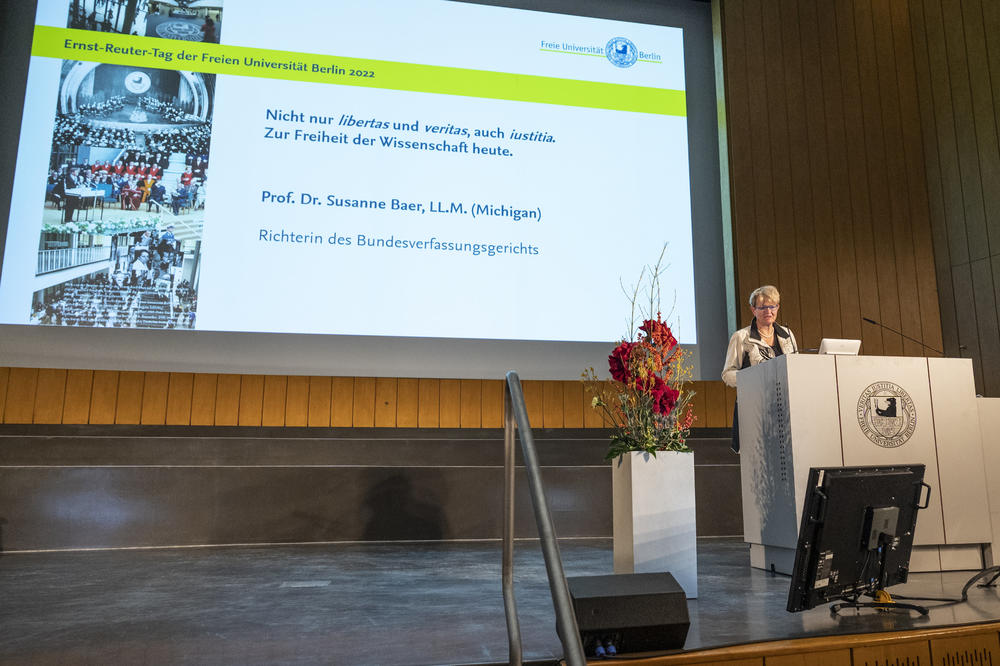“Free from Fear” – In Defense of Academic Freedom
Professor Susanne Baer, Justice of the German Federal Constitutional Court, holds keynote speech as part of the festivities celebrating 74 years since the founding of Freie Universität Berlin
Dec 23, 2022
In her speech, Justice Susanne Baer of the German Federal Constitutional Court emphasized the importance of science for democratic societies.
Image Credit: Christoph Assmann
The German academic landscape is currently facing great challenges, according to the Federal Constitutional Court justice and law professor, Susanne Baer. Speaking at the Ernst Reuter Day 2022 celebrations that marked the anniversary of the founding of Freie Universität, Baer called upon researchers to commit themselves to protecting academic freedom. She emphasized that universities have an obligation to act as centers of justice and debate. It is necessary to promote “science and enlightenment in the truest sense of the word – encouraging critical reflection, debate, and a tolerance for differences. Universities should not become places of destruction, manipulation, or attacks.”
In her speech, Justice Baer emphasized the importance of science for democratic societies. Researchers are not only responsible for delivering exciting findings; they are also guardians of truth tasked with upholding democracy. The New Right often actively works “against knowledge and science as the foundations of our democratic coexistence” by using instruments such as the Internet, leading media, and their various political strongholds. Lately, however, these individuals are “not only undermining political relations, but are also specifically targeting knowledge and science.”
The renowned legal expert also drew attention to the fact that attacks on academia are nothing new. One example of this is gender studies research, which has been plagued with accusations of being “unscientific” since the very beginning; a fate also shared by anti-racism research. Lately, climate change researchers and virologists have increasingly come under fire. In view of these continuous attacks on academia, Baer implored researchers: “Please do not let yourselves be taken in by simple resentment!”
With the aid of the three values that adorn Freie Universität Berlin’s seal – veritas, iustitia, libertas (truth, justice, freedom) – Justice Baer explained how universities and researchers can tackle the increasing hostility toward academia. She went on to declare a “serious crisis of truth,” claiming that “today’s mix of demagogy, targeted fake news, generally accepted alternative doctrines, the celebration of prejudice and the deliberate demonization of Otherness – including accusations that minority groups are censoring free speech –, the strategic use of false information and lies in the echo chambers of our fragmented public spheres – these are all aspects that put veritas in a very precarious position. And this is precisely what endangers libertas, or freedom. In doing so, iustitia, or justice, is the primary means that a democratic state has at its disposal for regulating this imbalance.”
Furthermore, Justice Baer emphasized the important role universities play in ensuring peaceful societal cohesion: “Universities are institutions – and thus opportunities – for debate. People come together to compromise and find good reasons for why certain norms apply.” These institutions protect libertas, thus providing researchers with the means to promote veritas as they see fit. However, it is generally agreed that this libertas is supposed to be used to contribute toward society as a whole – which is where the connection to iustitia comes in.
Building on this premise, Baer encouraged listeners to fight for academic freedom “even when researchers you disagree with are under attack.” After all, as specified in Freie Universität Berlin’s founding charter, one of the aims of the university is to promote an academic climate “free from fear.” “Here, we’re not talking about the fear of too few resources or too much political governance,” said Baer. And by no means is it referring to freedom from fear of criticism. Rather, it is referring to “an academic climate free from repression, discrimination, and defamation.”
To this end, Baer claims that there is still work to be done. Universities’ dedication to the truth means that they have a duty to disseminate knowledge and hone the skill of distinguishing between what is true and what is false, what is an attack and what is criticism. “Universities must not banish or silence controversy; they must face these head-on so that they can be dealt with appropriately.”
However, Baer also believes that universities are tasked with ensuring justice. This includes ensuring fair access to higher education for all. “We must continually ensure that those who are suited for higher education have the opportunity to go to university – regardless of the individual’s social background, name, or where they grew up or went to school. And we must ensure that the right people – the bold, the meticulous, the innovative – receive support, are duly recognized, and have the opportunity to advance without prejudice.”
While anchoring academic freedom as a key component within democratic society is an important responsibility of politicians on the regional and national level, this is also a responsibility of universities themselves. For example, executive boards and committees should ensure that a wide range of subjects continue to be offered at our universities. However, everyone can play their part. All university members are called upon to be “defenders of the basic right to academic freedom,” Justice Baer stated.
This article originally appeared in German on December 5, 2022, in campus.leben, the online magazine of Freie Universität Berlin.
Further Information
Read the campus.leben article on Ernst Reuter Day 2022 (in German).

